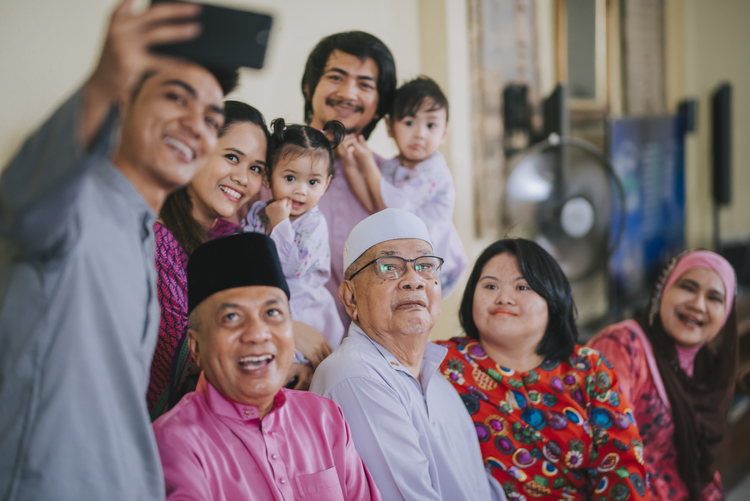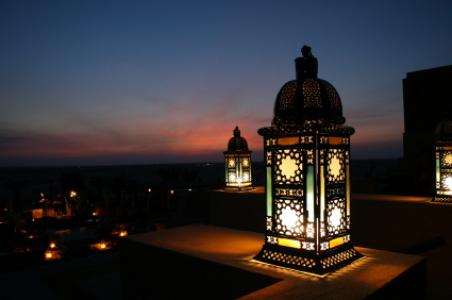
Do You Get a Black Moon?
What is a Black Moon, and why does it happen in December?
Muslims celebrate Eid al-Fitr to mark the end of the holy month of Ramadan. It’s a festive occasion and one of the major observances in the Islamic calendar.

Eid al-Fitr is a time to celebrate together with family and friends.
©iStockphoto.com/Edwin Tan
Eid al-Fitr is not a public holiday in the US. Businesses have normal opening hours. However, public schools in some areas close on the day.
On the day of Eid al-Fitr (also spelled Eid ul Fitr), Muslims in the United States and worldwide mark the end of the holy month of Ramadan. It is observed on the first day of the Islamic month of Shawwal.
People celebrate having accomplished the Ramadan fast (sawm), one of the most important and challenging religious duties for Muslims. This is why the holiday is also called the Festival of Breaking the Fast. It is thought of as Allah’s (God’s) reward for completing the task.
More than 3 million Muslims live in the United States, and for them, Eid al-Fitr is one of the biggest celebrations of the year.
In the country’s Muslim communities, you are likely to see people dressed up nicely, congregating for communal prayer, hugging each other, enjoying a festive meal together, and wishing each other Eid Mubarak (Happy Eid).
So, how exactly do American Muslims celebrate Eid al-Fitr? With Muslims from so many different backgrounds residing in the US, Eid customs vary from one community and family to the next—but there are some common features.
The day of Eid usually starts with communal prayer at the local mosque or another communal space, led by the local Imam. In cities with a sizeable Muslim population, such as New York and Philadelphia, people may congregate in parks or other public spaces.
In Washington DC, the Capitol Hill lawn has traditionally been a place where thousands of worshippers gather during Eid.
Muslims are expected to give to charity on the occasion of Eid. This can be a donation of food or money to the poor to enable them to take part in Eid celebrations. Several organizations in the US also offer the option to make online donations.
As a culmination of a month-long fast, a festive meal with a range of mouthwatering dishes is one of the most cherished features of Eid. In fact, the Quran forbids fasting on this day.
In each family, the food usually reflects the cultural background and unique family traditions. Many US Muslims are culturally linked to Arab countries in the Middle East and Africa.
But no matter the culture, many of the dishes served on Eid al-Fitr are sweet, so the occasion is also known as the Sugar Feast.
A favorite among children, Eidi or Eidiya is the tradition of exchanging gifts on Eid al-Fitr. The Hadith, a collection of texts about the Islamic Prophet Muhammad, states: “Give gifts to one another, you will love each other.”
The US president traditionally issues an official Eid greeting. They may also visit a mosque or hold a festive dinner at the White House to mark the occasion.
Each year, in the run-up to Eid, Muslims across the US agree to disagree on the question: when is Eid?
Eid al-Fitr happens on the first day of Shawwal, the 10th month of the Islamic calendar. In the western Gregorian calendar, the holiday falls about 11 days earlier each year.
However, the beginning of each Islamic month and the dates of Muslim holidays are determined by Moon sightings. A new month begins when the Crescent Moon is spotted in the evening sky after the New Moon phase. But the rules of what constitutes a valid sighting vary. So, some communities may celebrate two days, sometimes even three days, before or after other communities. Still, within each community, Eid usually only lasts for one day.
Scholars generally agree that Prophet Muhammad introduced the feast, although the timing is debated. According to some traditions, he initiated both Eid al-Fitr and Eid al-Adha after his journey (Hijrah) from Mecca (Makkah) to Medina in 622 CE.
The Muslim community in the USA is the largest in North America. About 3.5 million Muslims are estimated to live in the United States, making Islam the country’s third-largest religion.
Islam has been a part of American culture since the 19th century, a result of the slave trade of the antebellum period. Historians estimate that up to one in three slaves brought to North America was a Muslim.
Note: Regional customs or Moon sightings may cause a variation of the date for Islamic holidays, which begin at sundown the day before the date specified for the holiday. The Islamic calendar is lunar and the days begin at sunset, so there may be one-day error depending on when the Crescent Moon is first seen.
| Year | Weekday | Date | Name | Holiday Type |
|---|---|---|---|---|
| 2019 | Tue | Jun 4 | Eid al-Fitr | Muslim |
| 2020 | Sun | May 24 | Eid al-Fitr | Muslim |
| 2021 | Thu | May 13 | Eid al-Fitr | Muslim |
| 2022 | Mon | May 2 | Eid al-Fitr | Muslim |
| 2023 | Fri | Apr 21 | Eid al-Fitr | Muslim |
| 2024 | Wed | Apr 10 | Eid al-Fitr | Muslim |
| 2025 | Mon | Mar 31 | Eid al-Fitr (Tentative Date) | Muslim |
| 2026 | Fri | Mar 20 | Eid al-Fitr (Tentative Date) | Muslim |
| 2027 | Wed | Mar 10 | Eid al-Fitr (Tentative Date) | Muslim |
| 2028 | Sun | Feb 27 | Eid al-Fitr (Tentative Date) | Muslim |
| 2029 | Thu | Feb 15 | Eid al-Fitr (Tentative Date) | Muslim |
While we diligently research and update our holiday dates, some of the information in the table above may be preliminary. If you find an error, please let us know.

What is a Black Moon, and why does it happen in December?

When will the next comet be visible?

Why do mornings keep getting darker after the December solstice?

Many Muslims in the United States fast in the hours of daylight during Ramadan, the ninth month in the Islamic calendar.